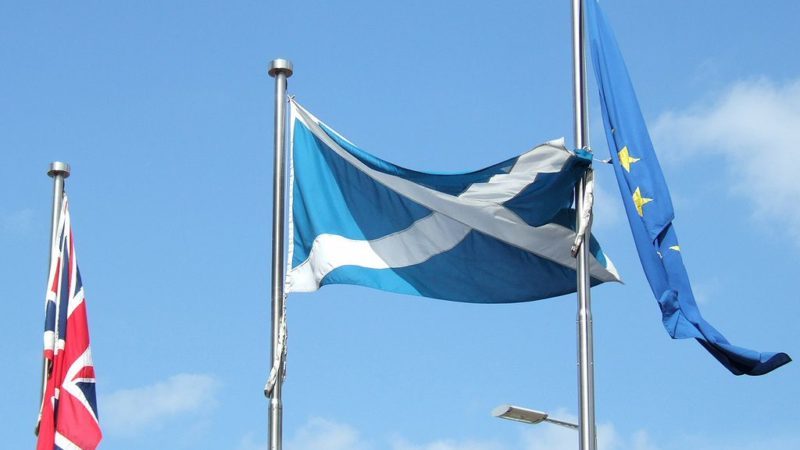There are still good strategic reasons why Westminster may decide to allow a referendum sooner rather than later.

It is a hard time for Scotland’s pro-union parties. Two polls released last week showed solid leads for Scottish independence in the event of another referendum, while pointing to the election of yet another pro-independence majority of MSPs in next May’s Scottish election.
They emphasised the political strength of Nicola Sturgeon, with neither the COVID crisis, the ongoing controversy surrounding Alex Salmond, or the Scottish Government’s calamitous handling of the exam results fiasco, having had any notable impact.
Scottish Labour leader Richard Leonard responded by re-affirming his support for the union. “We are going into next year’s election standing on a platform opposing a second independence referendum” he told ITV News, only hours after polling put his party on a record low of 16%.
The Scottish Tories may be in a slightly stronger position, but, after some successes, they are back to treading water in the polls and are being held back by their unpopular Westminster leadership.
All of this makes it harder to see how an emphatic win for the SNP can be stopped. And in that scenario, what would happen next? Saying no to another referendum and quoting the notorious “once in a generation” line has been manageable for pro-union parties until now. But is it viable in the long term?
A Union in peril
There is a longer-term story to be told about the fading of institutions and the political chasm between Scotland and the rest of the UK. However, the short-term factors that have increased support for independence are the election of Boris Johnson with an 80-seat majority and the implementation of Brexit.
It is hard to overstate Johnson’s impact: In the 12 national polls since his election, only 2 of them have shown a lead for the union (with the last 6 all putting Yes ahead).
Last Friday the Times reported that Michael Gove has taken-on the unenviable task of assembling a team to save the Union. Conversations have taken place with former Scottish First Minister, Jack McConnell, former Liberal Democrat Minister, Danny Alexander, and former Labour MP and Big Brother contestant, George Galloway.
With respect, none of them are political heavyweights anymore, and none have been elected to anything in Scotland since Danny Alexander held his Inverness seat in 2010. It is hard to see them as the dream team that the Union needs.
Why sooner may be better for the pro-union parties
There are still good strategic reasons why Westminster may decide to allow a referendum sooner rather than later.
Firstly, continuing to block it would not pass the fairness test. Polls show that a majority of Scots want a vote in the next five years, and that they believe the Scottish Parliament should have the power to call it. Those numbers will only increase if Westminster is seen to block.
Secondly, the long-term demographics look terrible for the Union. Not only is the SNP polling at record levels after 13 years in government, but, at present, two thirds of people under 50 support independence. There is little reason to believe that will improve over time or that many will develop a new-found commitment to the union after being refused a vote by a Prime Minister they did not support after applying a Brexit process they opposed.
Finally, as long as people are discussing the rights and wrongs of holding a vote, they are not talking about the implications. The SNP’s 2014 prospectus for independence could not be published today. It promised high oil prices, low taxation, and greater extra investment in public services.
With the long-term economic impacts of COVID and Brexit up in the air, the case for independence needs to be re-made. In that respect, the Yes side benefits from having the time and space to do that while debate continues to focus on the democratic legitimacy of such an exercise.
It will not be an easy task for the Scottish Government. Brexit massively strengthens the political case for independence, but it muddies the economic one. If a referendum is allowed, it would lead to a greater focus on policy, economics and the pro-union parties’ preferred territory of what dangers may await an independent Scotland.
A case of when rather than if
With the election only nine months away and a pro-independence majority starting to look like a foregone conclusion, the pro-union parties are likely to spend the campaign being asked whether or not the election of enough pro-independence MSPs should allow the Scottish Parliament to call a vote, and if not then why not.
It may be the last thing that any of them want, but perhaps they would be well-advised to say yes. The question for them isn’t really if another referendum should happen again, it is whether it is more winnable in the next parliamentary term, or further down the line when demographics have become even less favourable and they are seen to have been dragged kicking and screaming to it.
It is often said that you should never interrupt your enemy while they are making a mistake. With that in mind, I expect that Nicola Sturgeon may be tempted to take a vow of silence while Michael Gove, Boris Johnson and their colleagues find new and creative ways to try and delay what looks increasingly inevitable.
Andrew Smith is a Glasgow-based political campaigner. He works for a human rights organisation and tweets here.
Left Foot Forward doesn't have the backing of big business or billionaires. We rely on the kind and generous support of ordinary people like you.
You can support hard-hitting journalism that holds the right to account, provides a forum for debate among progressives, and covers the stories the rest of the media ignore. Donate today.



